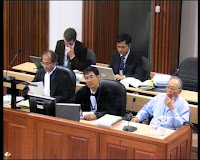 Drawing on French-inspired Cambodian criminal procedure, the Extraordinary Chambers in the Courts of Cambodia allows victims of the Khmer Rouge to participate directly in the proceedings as civil parties. Having worked with DC-Cam for nine months, I have had the opportunity to follow at first-hand the exciting developments in the area of victim participation. By and large, the Court has been very supportive of such participation. In a Decision of March 20th, for example, the Pre-Trial Chamber (pictured at right) adopted an expansive interpretation of the civil parties’ right to participate, stating that the Court’s Internal Rules are “clear in [their] wording that Civil Parties can participate in all criminal proceedings…” and that “Civil Parties have active rights to participate starting from the investigative stage…” (para. 36). Victims’ rights advocates welcomed this dec
Drawing on French-inspired Cambodian criminal procedure, the Extraordinary Chambers in the Courts of Cambodia allows victims of the Khmer Rouge to participate directly in the proceedings as civil parties. Having worked with DC-Cam for nine months, I have had the opportunity to follow at first-hand the exciting developments in the area of victim participation. By and large, the Court has been very supportive of such participation. In a Decision of March 20th, for example, the Pre-Trial Chamber (pictured at right) adopted an expansive interpretation of the civil parties’ right to participate, stating that the Court’s Internal Rules are “clear in [their] wording that Civil Parties can participate in all criminal proceedings…” and that “Civil Parties have active rights to participate starting from the investigative stage…” (para. 36). Victims’ rights advocates welcomed this dec ision, hailing it a “landmark decision.”
ision, hailing it a “landmark decision.”Thus, it came as a surprise that, during the hearing on Ieng Sary’s appeal against provisional detention (pictured at left), the very same Pre-Trial Chamber recently established a worrying precedent for direct victim participation. On July 1st and 2nd, the Judges issued oral decisions prohibiting civil parties – whether represented or unrepresented – from speaking in person during pre-trial appeals. Based on a narrow provision failing to anticipate the participation of unrepresented civil parties, these decisions contradict the general principle that civil parties may participate without a lawyer. Internal Rule 23(7) provides that “[a]ny Victim participating in proceedings before the ECCC as a Civil Party has the right to be represented by a national lawyer, or a foreign lawyer in collaboration with a national lawyer…” Therefore, the Judges’ decisions were not in accordance with the Rules.
It appears that this sea change in the Chamber’s attitude can be attributed to multiple attempts by one civil party to speak during the proceedings. Worryingly, the Judges appe
 ar to have denied her requests based upon their disinclination to hear from her, rather than upon a correct reading of the Rules. The civil party in question (pictured at right) had already addressed the bench during an earlier hearing, using the opportunity to advertise a book! At the recent hearing, after the Judges denied her request to speak as a represented civil party, she promptly dismissed her lawyer and requested that she be heard as an unrepresented civil party. The Judges once again refused her request, seemingly irritated by her repeated attempts to speak. Eventually, she stormed out of the courtroom, vowing not to return until “[she has] a voice.”
ar to have denied her requests based upon their disinclination to hear from her, rather than upon a correct reading of the Rules. The civil party in question (pictured at right) had already addressed the bench during an earlier hearing, using the opportunity to advertise a book! At the recent hearing, after the Judges denied her request to speak as a represented civil party, she promptly dismissed her lawyer and requested that she be heard as an unrepresented civil party. The Judges once again refused her request, seemingly irritated by her repeated attempts to speak. Eventually, she stormed out of the courtroom, vowing not to return until “[she has] a voice.”Undoubtedly, the civil party raised an important issue regarding the direct participation of civil parties. Despite seeking to further victims’ rights, she has done victims a great disservice by demanding a robust scheme for civil party participation so early in the proceedings. Albeit limited to pre-trial appeals, unrepresented civil parties will now be precluded from speaking in person. The Judges had – until this time – adopted a very progressive approach. When, however, the civil party sought to force their hand, the Judges responded negatively, restricting opportunities for direct participation for all civil parties. As victim participation before internationalized tribunals remains in its nascent stage, civil parties and their lawyers should give greater consideration to the impact of their strategies so as to avoid exacerbating the Judges’ concerns about the disruption caused by the civil party procedure.



